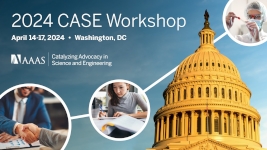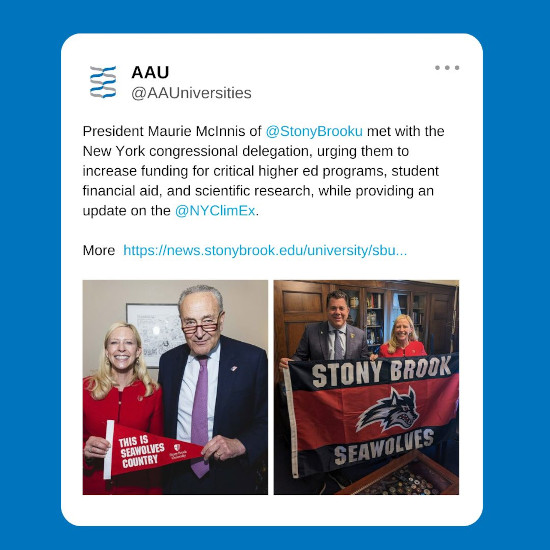 STEM Students Advocate for Science and Federal Research Funding on the Hill
STEM Students Advocate for Science and Federal Research Funding on the Hill
Earlier this month, more than 150 STEM students from 27 states gathered in Washington to learn about science policy and how to become effective advocates for science.
The annual Catalyzing Advocacy in Science and Engineering (CASE) Workshop is hosted by the American Association for the Advancement of Science and is designed to educate STEM students about “the role of science in policymaking” and “the federal policymaking process.” The workshop also empowers students “to become a voice for research throughout their careers.” Students from more than 30 AAU universities participated in this year’s workshop; the institutions covered all costs of students’ attendance.
AAU is one of the founding organizations of CASE, and AAU Senior Vice President for Government Relations and Public Policy Toby Smith spoke to students at this year’s workshop. He gave students an introduction to science and technology policy and advised them on how to effectively advocate for scientific research on Capitol Hill in the current political climate. Students learned about the federal budget and appropriations process and how congressional offices and committees operate. They also received tips for effective science communication and engagement with the federal policy process. At the end of the workshop, students had the option to visit congressional offices and speak to lawmakers and Hill staffers about the importance of federal funding for scientific research and graduate STEM education.
More information about the workshop as well as the application process is available here.

AAU Members’ Engagement in the American Talent Initiative Expands College Access to Low-Income Students
A new report shows that many AAU members are making significant progress in enrolling talented low-income students.
The American Talent Initiative was formed in 2016 with the ambitious goal of educating 50,000 more low-income students by 2025 at universities with graduation rates above 70%. A recent progress report by ATI shows that its members have made substantial progress toward the goal and in making college accessible to Pell Grant recipients and low-income students. Supported by Bloomberg Philanthropies, ATI has more than 135 member institutions, including more than 50 AAU institutions. Princeton University President Christopher Eisgruber and University of Illinois Urbana-Champaign Chancellor and AAU Board Chair Robert Jones are on ATI’s steering committee.
ATI’s progress report notes that, since 2016, ATI-participating institutions have enrolled an additional 18,100 Pell students even as the number of Pell students declined at non-ATI institutions. (More than 80% of Pell Grant recipients come from families with incomes of $40,000 or less.) ATI members have improved economic diversity in their student bodies through a range of strategies, including recruiting more transfer students, especially from community colleges; expanding need-based financial aid; and providing innovative, wrap-around services to students that helps them navigate higher education and steers them on a path to success.
According to ATI, the universities with the largest growth in Pell students include the University of Michigan; the University of Illinois Urbana-Champaign; the University of California, San Diego; Stony Brook University; and the University of Wisconsin-Madison. Additionally, Washington University in St. Louis more than doubled its Pell enrollment (a 116% increase) from 2015-16 to 2022-23, while the University of Chicago increased its Pell enrollment by 73% in the same time period.
 National Institutes of Health Increases Pay Levels for Pre- and Postdoctoral Scholars
National Institutes of Health Increases Pay Levels for Pre- and Postdoctoral Scholars
The National Institutes of Health recently announced that it will increase annual pay levels for predoctoral and postdoctoral scholars supported by the Kirschstein National Research Service Awards (NRSA) at NIH-funded external institutions over the next five years.
According to an NIH press release, in FY24, “Predoctoral scholars will receive an approximate 4% increase in their pay level bringing it to $28,224, and postdoctoral scholars will receive an approximate increase of 8%, with pay levels beginning at $61,008 and upwardly adjusted based on years of experience.” Eligible individuals will also receive a $500 increase in childcare subsidies and “an additional $200 for training related expenses.”
The revised pay levels, the NIH noted, are informed by the recommendations of the NIH Advisory Committee to the Director Working Group on Re-envisioning NIH-Supported Postdoctoral Training. The committee was charged with helping the NIH find ways to support postdocs and to reverse the decline in the number of individuals interested in working as postdocs. AAU Deputy Vice President for Institutional Policy Emily Miller formally represented AAU on the advisory panel and collaborated internally with AAU Associate Vice President for Government Relations and Public Policy Lizbet Boroughs. NIH Director Monica Bertagnolli has accepted the recommendations of the working group.
The NIH noted that, due to current funding levels, it expects the increase in pay levels to lead to a small reduction in the total number of NRSA awards. “Pending the availability of funds through future appropriations, NIH plans to further increase stipend funding levels over the next three to five years to reach the advisory group’s recommended starting pay level of $70,000 annually for postdoctoral NRSAs,” it said. An official notice from the NIH on the increases is available here.
AAU, Associations Ask Education Department to Extend Financial Value Transparency, Gainful Employment Reporting Deadline
Last week AAU joined the American Council on Education and 28 other higher education associations in sending a letter to the Department of Education sharing comments in response to the department’s information collection request on financial value transparency (FVT) and gainful employment (GE) reporting requirements. The letter urged the department to extend the October 1 reporting deadline and to “take into consideration the added financial and administrative burden on institutions to implement these new reporting requirements.”
The letter noted that the department’s new FVT/GE regulations require institutions of higher education “to report on at least 26 metrics, including on programs that could no longer exist.” The associated costs of reporting on these metrics for institutions would be more than $250 million collectively in the first year and more than $72 million collectively going forward. The letter also noted that the delays associated with the recent revision of the Free Application for Federal Student Aid (FAFSA) and the release of the FTV/GE reporting guidance have “significantly impacted the ability of institutions to focus on the preparation of data for FVT and GE.”
News of Interest
Tampa Bay Times: Here’s How USF Is Rising as a Major Research Institution – In an opinion essay, University of South Florida President Rhea Law discussed the university’s rising status as a leading research institution and the importance of federal investments in university research. “America’s leading research universities are generating some of society’s biggest breakthroughs and technological advancements that improve our quality of life,” she asserted, and argued that they need increased federal investments in order to continue doing so.
The New York Times: In an Election Year, 10 University Museums Focus on Democracy – Ten museums at public universities in the United States have joined forces this election year to put on nonpartisan exhibitions about democracy. The shows are designed to engage students, encourage voter participation, and provide spaces where students can come together, explore different points of view, and engage in civic dialogue. Nine of the 10 participating institutions are AAU members, including Michigan State University; Pennsylvania State University; Rutgers University; the University of California, Los Angeles; the University of Illinois Urbana-Champaign; the University of Iowa; the University of Michigan; the University of Oregon; and the University of Wisconsin–Madison.
Houston Chronicle: Feds Give Rice University, OpenStax $90M for Education Research Hub – The National Science Foundation has awarded $90 million to Rice University “to build the country’s largest education research hub, aiming to advance teachers’ knowledge of student learning strategies and boost outcomes for people from diverse backgrounds.” The award, which is the university’s largest ever federal research grant, was made to Rice’s OpenStax – “the world’s biggest publisher of free and open education resources.”
The Washington Post: Why Students Are Protesting at Columbia, Other Colleges Over Israel-Gaza War – Student protests over the Israel-Gaza war intensified on several university campuses last week; in some instances the protests led to students being arrested or facing other disciplinary action. Students have been demonstrating “in a show of solidarity with Palestinians” and demanding that “university endowments divest from military weapons manufacturers.”
The Denver Gazette: CU Boulder Announces New Chancellor – The University of Colorado Boulder announced that its board of regents has selected Justin Schwartz as the university’s next chancellor. Schwartz is a nuclear engineer and is the current executive vice president and provost at Pennsylvania State University. He will succeed retiring Chancellor Philip DiStefano on July 1.
Inside Higher Ed: University of Illinois Starts Computing School with $50 Million Gift – The University of Illinois Urbana-Champaign is using a $50 million donation from alumnus Thomas Siebel to launch a new school of computing and data science. The gift will enable the university “to continue shaping the future of technology and preparing students for success in a digital world,” said Illinois Chancellor Robert Jones.
Featured Research

Nurses Across the U.S. Cite Employer Failures as Their Top Reason for Leaving
Researchers at the University of Pennsylvania School of Nursing surveyed almost 8,000 registered nurses in New York and Illinois who left their jobs and found that, “aside from retirements, poor working conditions are the leading reasons nurses leave health care employment.” The research suggests that improving working conditions for nurses may help curb some of the staffing problems currently facing hospitals.

State-of-the-Art Techniques to Reduce Climate-Warming Cow Methane
New animal respiration chambers at Cornell University’s College of Agriculture and Life Sciences “will allow researchers to definitively measure, verify and monitor methane and other gas emissions from cows.” The chambers are the only ones currently in use in the United States and mark “an important step toward developing solutions for reducing methane – a potent greenhouse gas – emitted from cows.”
From Our Feeds

Stony Brook University President Maurie McInnis met with the New York congressional delegation during a visit to Washington earlier this month. She thanked members “for supporting cutting-edge defense and energy research in FY2024 federal appropriations” and also urged Congress to fund higher education and increase federal investments in science in FY25. “Congress must provide robust and adequate investments in science and innovation, and specifically financial support for science agencies, to advance the U.S. leadership role in research development and technology,” she said.